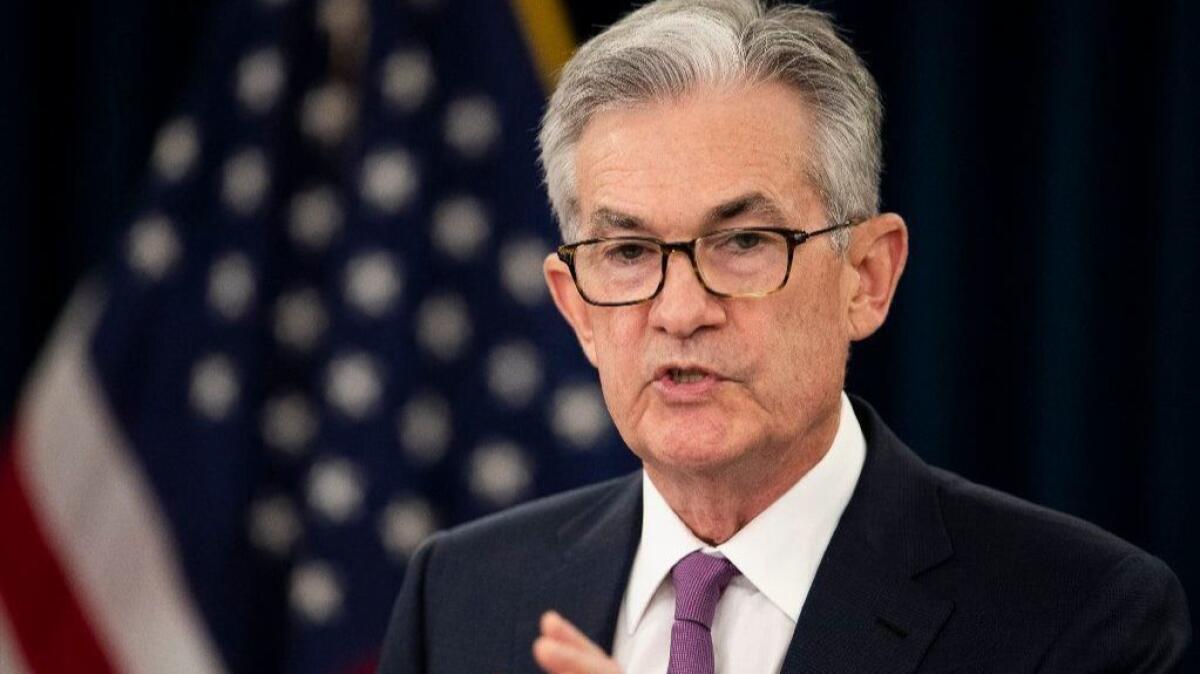Fed chief Jerome Powell keeps hope alive for interest-rate cuts

- Share via
Federal Reserve Chairman Jerome Powell said the U.S. economy is in a favorable place but faces “significant risks,” reinforcing bets for another interest-rate cut next month, though the remarks did not mollify President Trump.
“Trade policy uncertainty seems to be playing a role in the global slowdown and in weak manufacturing and capital spending in the United States,” Powell said Friday in a speech at the Kansas City Fed’s annual symposium in Jackson Hole, Wyo., minutes after China announced it would impose additional tariffs on $75 billion worth of U.S. goods and hours before Trump announced he’d ratchet up tariffs on Chinese goods.
“We will act as appropriate to sustain the expansion, with a strong labor market and inflation near its symmetric 2% objective,” Powell said.
He also emphasized that the Fed has a limited ability to soften the headwinds from trade-war-induced uncertainty, and that the current situation is not routine.
“In principle, anything that affects the outlook for employment and inflation could also affect the appropriate stance of monetary policy, and that could include uncertainty about trade policy,” Powell said. “There are, however, no recent precedents to guide any policy response to the current situation.”
Treasury yields fell after Powell’s remarks, and traders of fed funds futures extended slightly the amount of easing they expect from the U.S. central bank this year. Major U.S. stock indexes dropped more than 2%. Fed officials next meet Sept. 17 and 18.
Powell “is trying to set the record straight,” said Priya Misra, head of global rates strategy at TD Securities USA. “They are aware of higher risks since July 31, and they are saying they can ease while not ringing any alarm bells.”
Trump tweets
Trump, who has been repeatedly calling on the Federal Reserve to cut interest rates to support the U.S. economy during his trade war, immediately criticized Powell after the speech. “As usual the Fed did NOTHING,” he tweeted, adding: “My only question is, who is our bigger enemy, Jay Powell or Chairman Xi?”
It would be unusual for Fed officials to cut rates at Jackson Hole — outside of a normally scheduled policy meeting — unless there were signs of a sharp downturn or a financial panic. Trump added that the U.S. has a strong dollar and a “very weak Fed” and said he would “work ‘brilliantly’ with both.”
Citing slowing global growth and muted inflation, the Fed cut interest rates last month for the first time in more than a decade, reducing its target range by a quarter of a percentage point to a range of 2% to 2.25%. Powell described the rate reduction at the time as “a mid-cycle adjustment to policy,” telling reporters July 31 that it wasn’t the beginning of a long series of cuts.
But in his remarks Friday, Powell didn’t use that characterization and noted that the weeks since that meeting “have been eventful.”
Global risks
“We have seen further evidence of a global slowdown, notably in Germany and China. Geopolitical events have been much in the news, including the growing possibility of a hard Brexit, rising tensions in Hong Kong, and the dissolution of the Italian government,” Powell said, also mentioning one of the running salvos in Trump’s trade war with China.
His comments indicated he’s open to cutting interest rates again in September, said William English, a Yale University professor and former senior Fed economist.
“He certainly didn’t lean against the September ease, which the markets have priced in,” English said. “If he thought they were priced in the wrong place, I think he would have put in a bit more protest, and this didn’t feel to me like he was protesting.”
Investors have fully priced in another quarter-point reduction at next month’s meeting, and Powell’s remarks suggest the committee remains on alert for risks in the economy.
“We are carefully watching developments as we assess their implications for the U.S. outlook and the path of monetary policy,” Powell said.
Powell’s remarks examined U.S. monetary policy since World War II. He broke the analysis into three long-run questions: Can the central bank restrain inflation? Can the central bank buffer inevitable financial excess? Can the central bank still provide stimulus and counter-cyclical policy in a time of very low interest rates?
He answered the first two positively, saying that the Fed has the tools to quell inflation, while the post-crisis financial system is more resilient and monitoring has improved. Answers on the third question are a work in progress, he said.
“Our economy is now in a favorable place, and I will describe how we are working to sustain these conditions in the face of significant risks we have been monitoring,” he said.
Hawks vs. doves
Powell may face opposition from some of his colleagues at next month’s meeting. The July rate cut drew dissents from two members who favored holding interest rates steady: Kansas City Fed chief Esther George and Boston’s Eric Rosengren, both of whom reiterated this week that they want to see more evidence of a U.S. slowdown before moving rates again.
Philadelphia Fed chief Patrick Harker and Cleveland’s Loretta Mester made similar arguments Friday. “Right now, we are where we need to be,” Harker said in a Bloomberg Television interview. “There are clearly downside risks to the economy. We would have to act as appropriate if those look like they are coming to fruition.” Neither of them are voters this year on the rate-setting Federal Open Market Committee.
More to Read
Inside the business of entertainment
The Wide Shot brings you news, analysis and insights on everything from streaming wars to production — and what it all means for the future.
You may occasionally receive promotional content from the Los Angeles Times.










